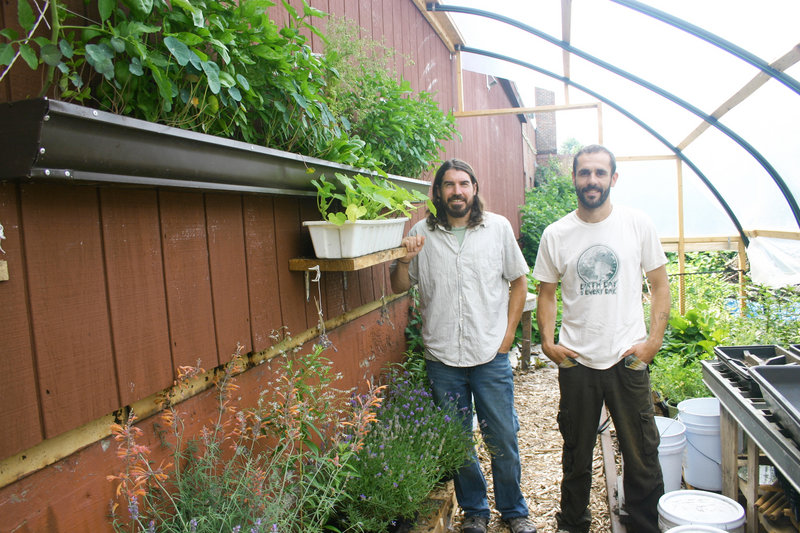Even a small patch of earth in a neglected industrial area can become an oasis of food production.
That’s one of the lessons to be learned at the new Urban Farm Fermentory located on Anderson Street in Portland’s East Bayside neighborhood. Tucked in back of a single-story former warehouse and hidden from view by a jungle of Japanese knotweed, a greenhouse and a container garden grow lush and verdant with the fullness of midsummer. Here, tomatoes ripen and lavender blooms along with cilantro plants.
The garden is both a laboratory for small space cultivation experiments and a demonstration area for others interested in urban farming. However, the garden is just one piece of a larger business being created by Eli Cayer and David Homa.
The two are in the process of obtaining permits and approvals to run a winery that will brew fruit wines and herb wines and possibly contract with other companies that produce fermented beverages, such as kombucha. Plans call for production to begin by the end of this year.
Cayer is one of the founders of Maine Mead Works, which he is no longer involved with, and Homa runs Post Carbon Solutions and Kzeloumsen Perma-culture Gardens.
Inside the building, the space is fairly barren, with the exception of colorful murals painted by artists Heidi Green, Frank Cassasa and a few graffiti artists who prefer to work anonymously. Behind a bank of windows, three fermentation rooms await equipment.
“The whole idea is to have multi-layered engagement,” Cayer said. “It’s really about live culture.”
Cayer’s statement encompasses the garden out back, the future fermentation business, the collaboration with artists and the weekly education series.
Urban Farm Fermentory hosted its first class last week, which explored the basics of city gardening. Going forward, classes will be held each Tuesday from 6 to 9 p.m. The next one takes place July 20 and examines the concept of sheet mulching and no-till gardening. During the class, Homa will demonstrate how to create a raised bed and then layer on organic matter to essentially compost in place and create a rich soil for the next growing season.
The classes will change with the seasons and will include topics such as soil building, season extension, advanced container gardens, vertical gardening and removing soil contaminants with plants. Some sessions will offer screenings of food-related documentaries and others will provide hands-on demonstrations in cider-making, pickling or canning.
“One of the things we want to do is help people re-skill,” Homa said.
This desire to teach people the foodways and basic living skills that our grandparents and great-grandparents took for granted comes from the pair’s interest in permaculture. This philosophy advocates living and landscaping in harmony with the earth.
Homa explained that a permaculture garden represents a “shift from ornamentals to edibles and medicinals. It’s far more resilient in changing times and in a petroleum-based world.”
Outside in the garden, everything is fashioned from salvaged items and re-purposed industrial scraps. Because the garden sits over an old rail spur, the soil is contaminated and not suitable for growing vegetables. Instead, containers of various types and sizes are placed both inside and outside of the greenhouse and even attached to the building’s exterior wall.
The vertical garden includes grow pockets, made from fabric and hung from the siding, and a salvaged rain gutter nailed to the exterior of the building. Both are filled with soil and topped off with plants, such as basil and nasturtiums.
“It’s opening up people’s concept of where you can grow,” Cayer said.
When fall arrives, Homa intends to install unheated hoop houses in the garden and host a few classes to teach people how to do the same.
“I’ve been doing it going on six years,” Homa said of this innovative style of growing in a cold climate. “If you have the right variety of plants, a solid structure and a good location, you can eat salad all year.”
Another idea in the pipeline is the formation of a crop mob. Cayer took part in one during a recent trip to North Carolina and sees potential for such a group in Maine.
The concept goes back to the days of community barn raisings, when everyone turned out to help a farmer with a big project.
The Urban Farm Fermentory crop mob would identify volunteers who would then descend on a local farm to help with whatever needed doing.
It’s just one of the many ideas currently brewing at the fermentory, which is sure to nourish the Greater Portland community for years to come.
Staff Writer Avery Yale Kamila can be contacted at 791-6297 or at: akamila@pressherald.com
Send questions/comments to the editors.


